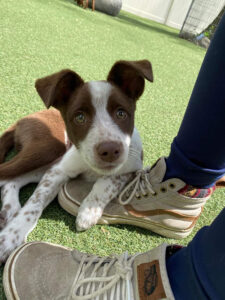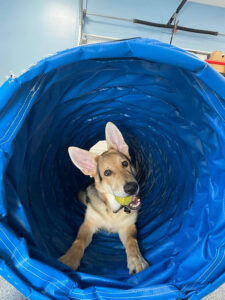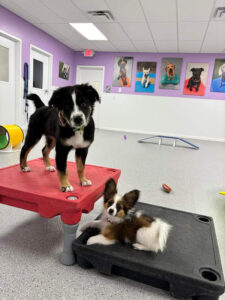Written by Laurie Yost, current owner of a crazy puppy, Mosha, and owner of Playful Pups Retreat.
 Playful Pups Retreat is proud to be a Fear Free certified facility. Laurie also holds the highest level of certification through PACCC (Professional Animal Care Certification Council) with a CPACO certification (Certified Professional Animal Care Operator).
Playful Pups Retreat is proud to be a Fear Free certified facility. Laurie also holds the highest level of certification through PACCC (Professional Animal Care Certification Council) with a CPACO certification (Certified Professional Animal Care Operator).
Has your family recently added a new furry baby to the household? If so, I am sure you know that a new puppy is a LOT of work, right? As dog lovers we have been there ourselves and understand the time and effort a puppy takes. They pee, poo, and chew their way right through your house, but we are here to help! Playful Pups Retreat is proud to offer an exceptional Puppy Social Skills Daycare program designed to help busy pet parents with basic training skills, including crate and potty training. Our innovative puppy daycare program includes confidence building and establishing a foundation of life skills necessary for vet or grooming visits too. We are here to help get your puppy started off on the right paw.

Here are our Team’s 10 Favorite Tips to Puppy Training Success:
- Build and enhance your relationship with your puppy through fun, structured play, and short daily training sessions.
- Exercise, mental stimulation, and socialization are keys to raising a happy, well-behaved puppy. Regular play and new experiences should be a part of every pup’s routine.
- Practice dog training once or twice a day for 5-15 minutes each session. Make this your average. If you prefer more, go for it!
- Practice in different environments. Start in a non-distracting place (ex: a quiet bedroom) and gradually work your way up to more challenging situations (ex: the park).
- Vary your rewards. Dogs get bored just like we do. Use a variety of toys, touch, praise, food, and real-life rewards. For example, request that your pup Sit before you: play a game with a toy, open a door for him, invite him into your lap for petting, deliver a meal, give him attention when you come home, or let him out of the crate.
- Be consistent with your cues and rules. Request behaviors with the exact same verbal cue or hand signal every time. Also, don’t allow a behavior sometimes and then get upset with your puppy for doing it at other times (ex: jumping or begging at table).
- Manage your puppy’s environment to set him up for success and don’t give him opportunities to get into trouble. When you catch him doing good things be sure to reward him for it!
- Timing is everything. Let your pup know if you like or dislike a behavior while it is happening. Two seconds after is too late.
- If you “correct” your pup, then redirect your pup. If you interrupt or distract your puppy from something he is doing wrong, give him something else to do that is right (and make the right behavior more fun!).
- Always communicate clearly with your voice, body language, and facial expression whether you are sending a signal of “yes” or “no” to your pup.

Still feeling frustrated? Our skilled team of Puppy Trainers is here to help! Learn more about our Puppy Social Skills Daycare program at Playful Pups Retreat.
